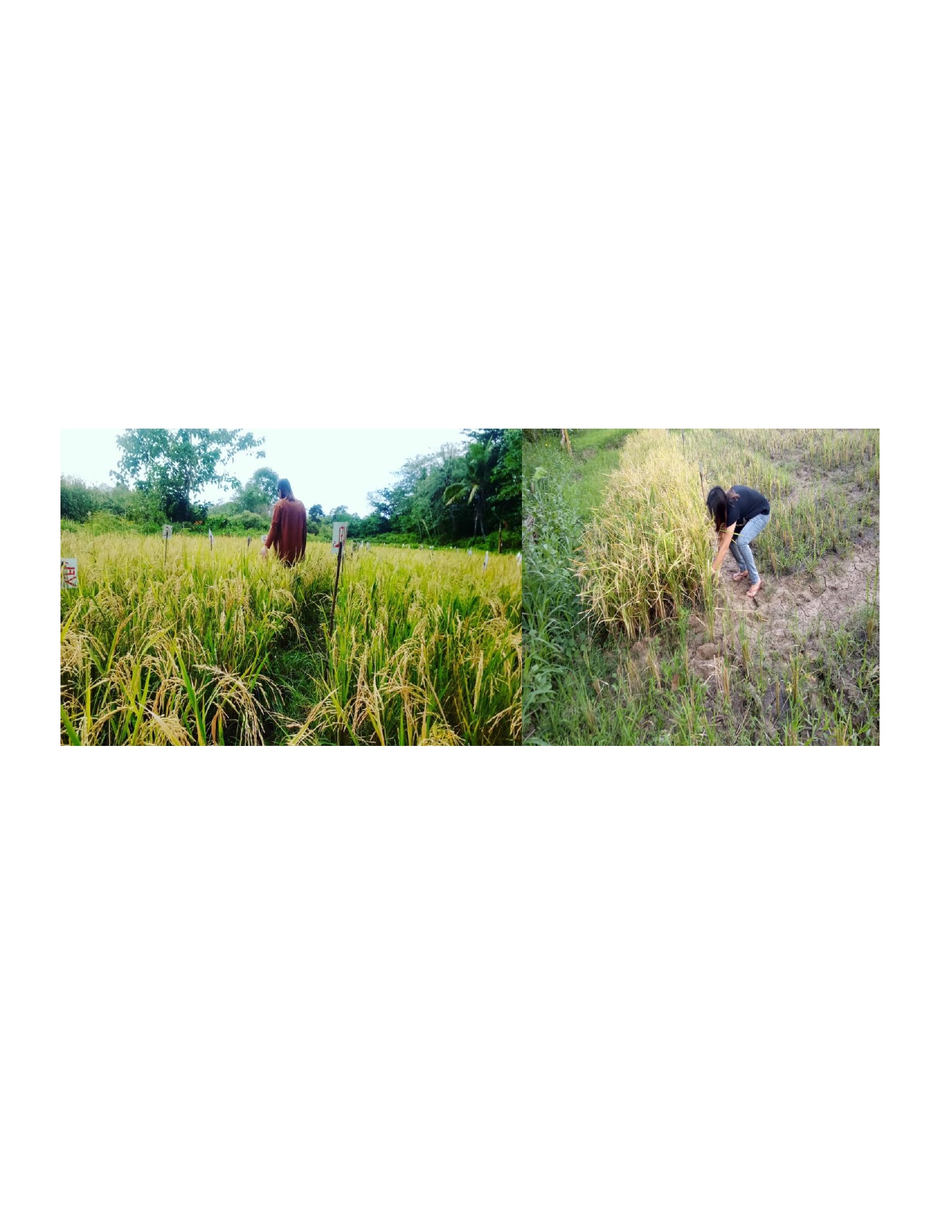Performance of Hybrid and Inbred Rice Varieties under Vermicast Application
Main Article Content
Abstract
This study aimed to evaluate the performance of hybrid and inbred rice varieties using vermicast as fertilizer. Soil chemical properties, plant growth, and yield performance were observed and tested for significant differences. The experiment employed a Randomized, Completely Design-Factorial layout with three replications of 30 plots. Six check plots were also prepared as farmers fertilization practices for rice production. The total experimental area is 468 m², with a planting distance of 20m x 20m and a total plant population of 5,376. Factor A involved six rice varieties, and Factor B included varying vermicast levels. Growth parameters and yield components were assessed, and data were analyzed using two-factor ANOVA and LSD test. Results indicated significant differences among rice varieties in days to flowering, days to maturity, plant height, and grain yield per hectare. However, no significant differences were observed in productive tillers, filled grains, and thousand-grain weight. No interactions were observed between rice varieties and vermicast levels. Soil analysis revealed an increase in available phosphorus but a decrease in total nitrogen and potassium content in the soil after the experimental study. Based on the observed results, the study recommends utilizing the NSIC Rc314H variety in rice production with a vermicast application rate of 5 tons per hectare for better crop yield. Future research on vermicast application in lowland rice is highly recommended for more conclusive findings and valuable insights into optimizing rice cultivation with specific varieties and application for improved yield and sustainable agricultural practices.
Article Details

This work is licensed under a Creative Commons Attribution-NonCommercial-NoDerivatives 4.0 International License.
References
Chauhan, B. S.; Jabran, K.; Mahajan, G. (Eds.). Rice production worldwide (Vol. 247). Cham, Switzerland: Springer International Publishing. 2017.
Medina, M. J. C.; Untalan, M. K. C.; Caliva, P. B. K. R.; Gayeta, H. A. C.; Guevarra, S. L. C. Design and Development of Milling Machine for the Production of Adlai (Coix lacryma jobi L) Grains. Asia Pacific Journal of Multidisciplinary Research, 2015, 3(4).
Tallada, J. G. (2020, July 16). Precision agriculture for rice production in the Philippines. FFTC Agricultural Policy Platform (FFTC-AP). 2020, https://ap.fftc.org.tw/article/1416
Steel, R.G.D.; J.H. Torrie. Principles and procedures of statistics. 2nd edition, McGraw Hill Book Co. Inc. Singapore, 1980. 172-177.
PSA [PHILIPPINE STATISTICS AUTHORITY]. Volume and area of Palay Production. 2018. https://countrystat.psa.gov.ph/ (accessed March 08, 2024).
Yadav, S.; Evangelista, G.; Burac, M. A.; Rafael, M.; Cabangon, R.; Tokida, T.; Mizoguchi, M.; Regalado, M. J. Determinants in the Adoption of Alternate Wetting and Drying Technique for Rice Production in a Gravity Surface Irrigation System in the Philippines. Water, 2021, 14(1), 5. https://doi.org/10.3390/w14010005
Liliane, T. N.; Mutengwa, C. S. Factors affecting yield of crops. In IntechOpen eBooks. 2020. https://doi.org/10.5772/intechopen.90672
National Seed Industry Council. 2024. https://nsic.buplant.da.gov.ph/registry.php
Palanog, A. D.; Calayugan, M. I.; Bello, G. E.; Manigbas, N. L. Role of improved varieties in the Philippine rice production. Rice-Based Biosystem Journal, 2021, 8, 51-64.
Rodriguez, D. G. An Assessment of the Site-Specific Nutrient Management (SSNM) Strategy for Irrigated Rice in Asia. Agriculture, 2020, 10(11), 559. https://doi.org/10.3390/agriculture10110559
Gayar AE. A study on: Nutrients in Sustainable Cropping Systems. Adv in Agri, Horti and Ento: AAHE-144. 2021.
Zhong, Z.; Gao, S.; Chu, C. Improvement of nutrient use efficiency in rice: current toolbox and future perspectives. Theoretical and Applied Genetics, 2020, 133(5), 1365–1384. https://doi.org/10.1007/s00122-019-03527-6
Masud, M.; Baquy, M. A. A.; Akhter, S.; Sen, R.; Barman, A.; Khatun, M. Liming effects of poultry litter derived biochar on soil acidity amelioration and maize growth. Ecotoxicology and Environmental Safety, 2020, 202, 110865. https://doi.org/10.1016/j.ecoenv.2020.110865
Barbadillo, M. A.; Macapanas, R.; Armecin, R. B. Reformulation of vermicast as organic fertilizer for corn. Annals of Tropical Research, 2021, 76–87. https://doi.org/10.32945/atr4327.2021
Bhunia, S.; Bhowmik, A.; Mallick, R.; Mukherjee, J. Agronomic Efficiency of Animal-Derived Organic Fertilizers and Their Effects on Biology and Fertility of Soil: A Review. Agronomy, 2021, 11(5), 823. https://doi.org/10.3390/agronomy11050823
Department of Agriculture-Bureau of Agricultural Research. Vermicasting: cultivating soil and improving farmer’s harvest and income. 2024. https://bar.gov.ph/index.php/23-press-room/news-and-events/389-vermicasting-cultivating-soil-and-improving-farmer-s-harvest-and-income
Mapile, M. R.; Aspe, N. M.; Obusan, M. C. Vermicast Analysis with the Earthworm Species Pheretima losbanosensis (Crassiclitellata: Megascolecidae): Bacterial Profiles for Potential Applications in Agriculture. Applied Sciences, 2022, 13(18), 10364. https://doi.org/10.3390/app131810364
Ruan, S.; Wu, F.; Lai, R.; Tang, X.; Luo, H.; He, L.. Preliminary Application of Vermicompost in Rice Production: Effects of Nursery Raising with Vermicompost on Fragrant Rice Performances. Agronomy, 2021, 11(6), 1253. https://doi.org/10.3390/agronomy11061253
Rahman, S.; Barmon, B. K. Greening Modern Rice Farming Using Vermicompost and Its Impact on Productivity and Efficiency: An Empirical Analysis from Bangladesh. Agriculture, 2019, 9(11), 239. https://doi.org/10.3390/agriculture9110239
Kheyri, N. Effect of the rate and application time of vermicompost on the yield and yield components of rice (Oryza sativa L. 'cv. Tarom Hashemi'). Applied Field Crops Research, 2017, 30(2), 91–110. https://doi.org/10.22092/aj.2018.114711.1169
Elissen, H., Van Der Weide, R., & Gollenbeek, L. (2023). Effects of vermicompost on plant and soil characteristics - a literature overview. https://doi.org/10.18174/587210
Lu, J.; Wang, D.; Liu, K.; Chu, G.; Huang, L.; Tian, X.; et al. Inbred varieties outperformed hybrid rice varieties under dense planting with reducing nitrogen. Sci. Rep. 2020, 10, 8769. https://doi.org/10.1038/s41598-020-65574-0


